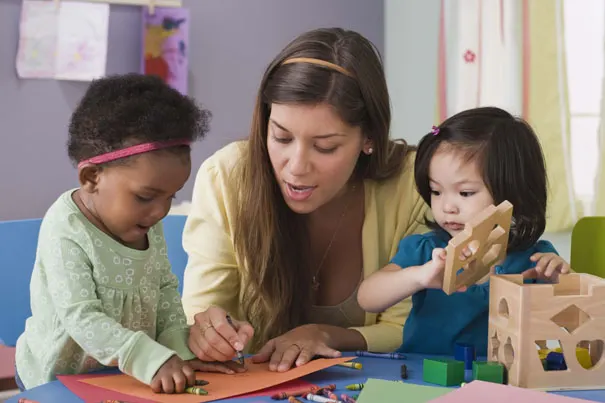Toddler Learning and Playtime
Play is perhaps the most important activity of young children. It's their "work," their principal occupation, and how they learn! Even when this process may not be obvious, learning occurs all the time for young children. They learn by exploring the world around them, interacting with people they meet, and experimenting with things they come across.
Toddlers Learn From Each Other
When children play with siblings and friends, they learn from each other. As questions, challenges, and conflicts arise, they figure out how to solve problems.
When your child plays in a group made up of different ages, he has the opportunity to learn in two different ways: first, by modeling the behavior of the older children, and second, by "teaching" the younger or less advanced children.
Toddlers Learn by Doing
Learning is an active process. The more hands-on experiences your child has, the more curious and capable he'll become. Children are fascinated by the work grownups do — cooking, household chores, and fixing things. What's more, these real-life tasks have tremendous learning value for children. So give your child his own small bowl of pancake batter to mix and a child-size broom so he can help sweep the floor.
Outdoor play — running and climbing — is essential for healthy physical development, and it's a chance for him to investigate nature.
Toddlers Learn by Creating and Imagining
You can further expand your child's learning opportunities by keeping materials around the house that encourage him to express his ideas. Some good materials include:
Paper, pencils, crayons, scissors, glue, and tape for drawing, writing, and constructing
Cardboard boxes and other commonly found objects
Easel paints and watercolors
Water, sand, play dough, and clay for sensory experiences
Building blocks and Legos
Dress-up clothes, hats, and props
Toddlers Learn From the Adults in Their Lives
Your lifelong offering of unconditional love and support is essential for your child to thrive and develop. This relationship provides the sense of security and positive self-esteem your child needs in order to achieve and to learn. With emotional support in place, you can help your child get the most out of play (and therefore learning) by following these suggestions:
Be specific and supportive. Telling your child "You have to share" isn't very helpful. At best, she'll cooperate while you're looking on. But if you guide her through the turn-taking process, she'll understand more about how to share next time.
Help your child be a good observer. Children learn from actively studying the world around them. If you take a walk with your 3-year-old and come upon a construction site, share her interest in the activity by stopping to watch and exclaiming, "Wow! Look how big the wheels on that dump truck are."
Model positive behaviors. One of the most powerful ways your child learns is by following your example. This process happens naturally and almost unconsciously. For example, when your child sees you reading regularly, she will want to read and be read to. And reading is one of the most important things you can do with your child!
Use positive language. Everyone responds better to positive words than to negative ones. Instead of issuing a command or a prohibition ("Don't throw the ball over there!") offer a suggestion of what your child can do ("That's a good place to throw the ball").
Play is the work of childhood. It's how your child learns about the world and how to get along in it. When you support your child in this challenging job, then your child's work really will be child's play.
Read more about Toddler
Join a World of Support
through Pregnancy and Parenthood.
TRACK WITH TOOLS
LEARN WITH EXPERTS
GET REWARDED












